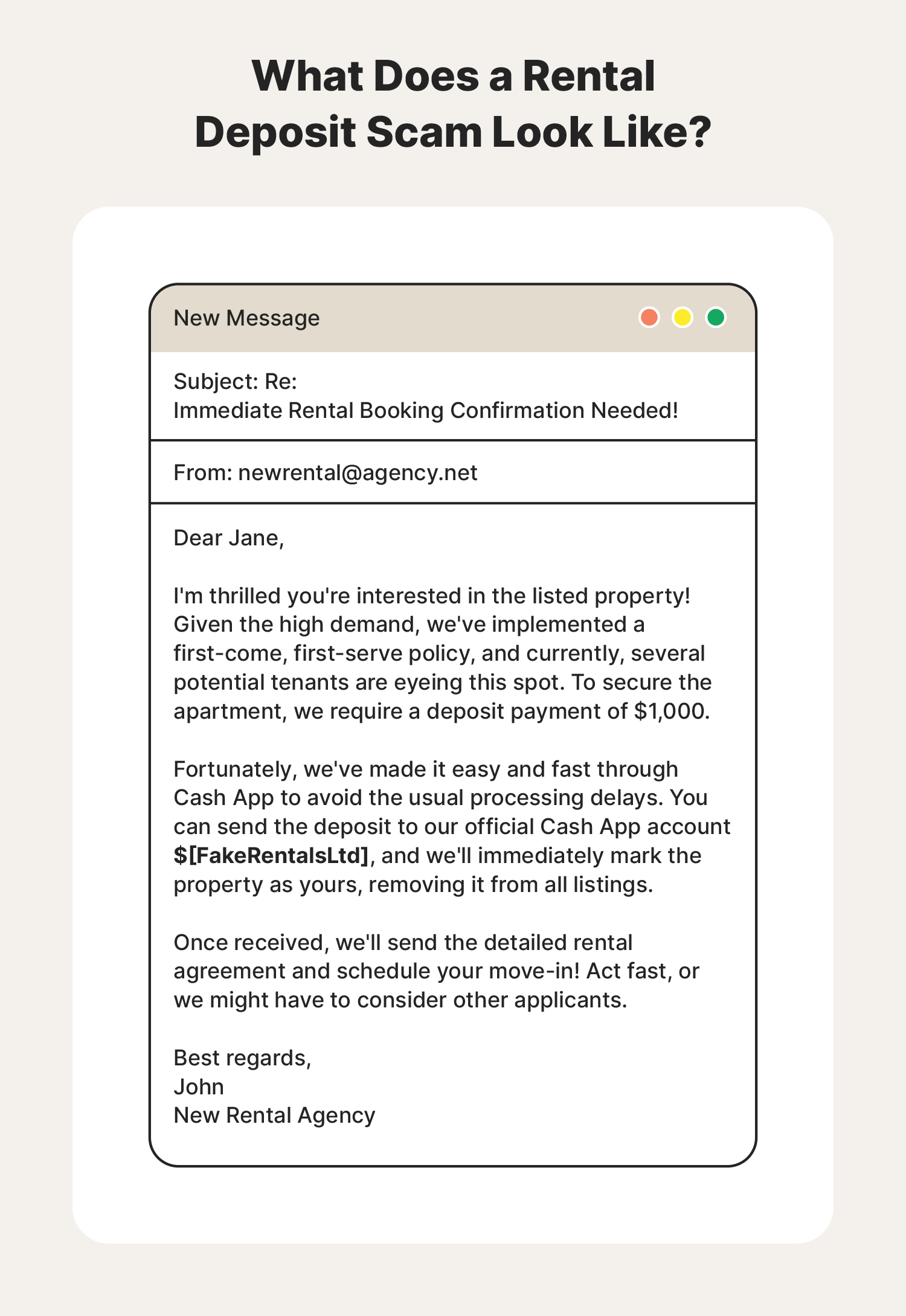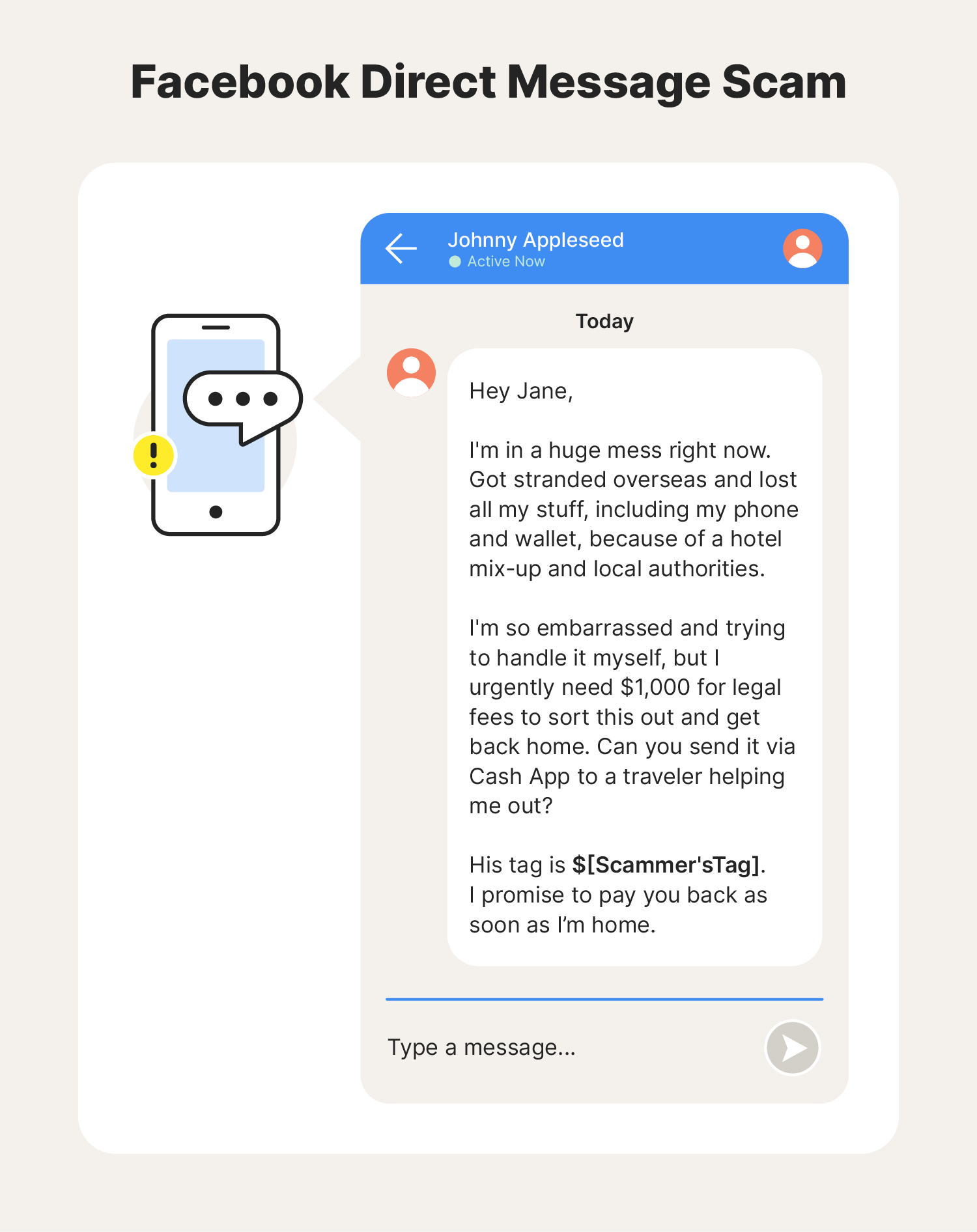
Cash App is a mobile app that allows users to conveniently transfer money between other Cash App users. Users can use it for online purchases, stocks, Bitcoin, and more. Because of its convenience, Cash App scams are a persistent threat, with scammers compromising user identity, credit card information, and more. Identity theft protection like LifeLock Standard can help protect your personal information so you can shop, share, and bank more securely online.
According to a Pew Research Center study, 1 in 10 payment app users have been impacted by hacking related to these apps. That means it's important to understand how these scams work and how you can identify them before someone tries to take advantage of you.
How does Cash App work?
Cash App is a phone application that allows users to send and receive money. To send money, users input a recipient’s email, phone number, or $Cashtag (an in-app username) and send the money. Users can also add money to their Cash App account by linking their bank account to it.
- Buying, selling, and withdrawing Bitcoin
- Investing in stocks
Because of its digital finance capabilities, the user spectrum includes university students, freelancers, investors, small businesses, online sellers, and more. With such a broad user base, there are a variety of methods scammers can use to take advantage of people on Cash App.
Types of Cash App Scams
Cash App scams are broad and many, as these scams range from deceptive investment opportunities to sophisticated social engineering tactics. They often involve tricking users into sending money under pretenses or divulging sensitive personal information. Below is an overview of some common types of Cash App scams, highlighting their mechanisms and the warning signs users should be aware of to protect themselves.
1. Cash Flipping
Cash flipping scams on Cash App happen when scammers promise victims that they can turn a small amount of money into a larger sum within a short time. Scammers will pose as financial experts and make initial contact via email or through social media platforms like Instagram, Facebook, and X (formerly Twitter).
Here’s how cash flipping works:
- Unrealistic promises: Scammers will fake expertise and claim they can turn $100 into $1,000 through an in-app function, app partnership, or a system loophole.
- The hook: These scammers may provide fake testimonials, credentials, and evidence to reel the user in further.
- Transferring funds: Scammers instruct users to transfer a certain amount of money to them to flip, and once they receive the funds, they disappear or block the user.
2. Loan scams
Loan scams on Cash App are a type of loan fraud where users believe they will receive a loan from a lender. This lender becomes a deceptive scammer who exploits the transfer feature, making it difficult for victims to recover lost funds.
Scammers use Facebook Marketplace, Instagram, or email to offer products or loans to potential victims. Their outreach often targets people having financial difficulties, such as students.
Here’s how loan scams work:
- Upfront fee: Scammers claim they can secure a loan, regardless of the user’s financial situation, with an upfront fee.
- Transferring funds: Scammers will instruct users to transfer the upfront fee via Cash App’s transfer feature.
- Disappearance: The lender will disappear with the transferred funds and may block the user or delete their account.
3. Mistaken or accidental payment received scam
Mistaken payment or accidental payment scams happen when a scammer tricks the victim into sending money by pretending to have mistakenly sent a payment to the victim. This scam plays on the victim's sense of empathy and fairness.
Here’s how mistaken or accidental payment received scams work:
- Unexpected payment received: The scam begins when you receive a notification from Cash App that somebody deposited money into your account. This unexpected payment comes from an unknown source, usually a stranger.
- Request to receive money back: The scammer pleads with you to return the "accidentally sent" money. They might ask you to return the money to a different Cash App account, claiming they used the wrong account for the original transaction.
- The scam: If the user complies and sends the money back, the scammer will then reverse the original payment they sent (if they used a stolen credit card or bank account, the real owner might notice the unauthorized transaction and initiate a chargeback).
4. Rental deposit scams
Rental deposit scams are a type of Cash App rental scam where scammers target individuals seeking rental properties. They exploit the trust of potential renters and use Cash App’s transfer feature to steal money.
Here’s how rental deposit scams work:
- Fake listing: Scammers post listings for rental properties at attractive prices, often on legitimate real estate or classified ad websites. These listings might feature completely fake properties or some that are real but unavailable.
- Initial contact: When responding to the listing, the scammer, posing as the landlord or rental agent, often claims they cannot show the property in person due to being out of the country, in a different state, etc.
- Urgency: The fake landlord pressures users to decide quickly, often stating that several other potential tenants are waiting. They may ask for the first month's rent, and if you make a payment, they will take the funds and go no-contact.

5. Investment scams
Investment scams on Cash App exploit users' desires to increase their wealth without significant effort or investment knowledge. These scams often promise high returns for minimal risk.
- Fake investment opportunities: Scammers reach out to potential victims through social media and email, presenting opportunities for lucrative investments. These might be in stock trading and cryptocurrency investments such as Bitcoin.
- Direct in-app payments: Scammers instruct victims to make their investments by sending money to the scammer's account. Once they receive payment, they go no-contact and may block the user.
6. Cash Card scams
Cash Card scams involve various deceptive practices where scammers trick Cash App users into handing over their Cash Card details, PIN, or funds. The Cash Card is a Visa debit card that allows users to use their Cash App balance to make purchases or withdraw cash from ATMs.
Here’s how cash card scams work:
- Direct messages: Scammers impersonate Cash App customer service and send phishing emails or texts. These messages try to alarm users by claiming there's a problem with their Cash Card that requires immediate attention.
- Fraudulent links: The messages often contain a link that leads users to a fake webpage with forms they must fill out with their Cash Card information.
- Unauthorized transactions: Once scammers obtain the Cash Card details, they can make unauthorized transactions, draining the victim's Cash App balance.
7. Fake pet deposit scams
Fake pet deposit scams are a type of fraud where scammers promise high-demand pets for a discounted price. Scammers additionally ask for payments to transport the pet and vet fees. These Cash App scams play on victims’ emotions by claiming the pet needs immediate rehousing.
Here’s how fake pet deposit scams work:
- Fake pet listings: Scammers post advertisements on social media or classified ad platforms like Craigslist of pets at a reduced price.
- Communication: The scammer poses as the pet owner or breeder and builds trust with potential buyers. They often seem caring, asking questions to ensure their pet goes to a good home.
- Payment requests: The scammer eventually asks for money for pet shipping fees, special travel crates, insurance, or vaccination. They insist on using Cash App to secure payment. Once payment is received, they go no-contact.
8. Social engineering
Social engineering scams are deceptive tactics that exploit human psychology to trick individuals into revealing personal information, such as passwords, financial information, or other sensitive data.
In the context of Cash App, social engineering scams take advantage of users' trust, lack of knowledge, or fear of having their accounts compromised. Scammers tend to impersonate user’s friends or family in distress to create a sense of urgency to receive payments.
Here’s how social engineering scams work:
- Impersonation of friends or family: Scammers impersonate a friend or family in distress. They may also have hacked the friend’s or family member’s account and posed as them to be more convincing.
- Communication: Scammers will request users to send money via Cash App so they can pay for an urgent cost that is causing them distress. This can be an emergency hospital bill, a plane ticket, etc. Once payment is received, they will stop responding.

9. Data breach scams
Data breach scams involve a type of fraudulent activity where scammers capitalize on reports of data breaches, which are incidents in which sensitive, protected, or confidential data has been exposed.
These scams may not necessarily mean that Cash App itself has suffered a data breach but that scammers are exploiting users' fears around data breaches.
Here’s how data breach scams work:
- Fear exploitation: Scammers send notifications, emails, or text messages to users, falsely claiming that Cash App has experienced a data breach. These communications create a sense of urgency and panic, instructing users to act fast to secure their money.
- Fraudulent links: The message may contain a link directing users to a phishing website asking them to enter their login credentials, personal information, or financial details.
- Compromised identity: Scammers can then capture this information and access the users' linked bank accounts and personal information.
10. Purchase and refund scams
Purchase and refund scams on Cash App occur when scammers deceive users into sending them money due to alleged transaction errors, refunds, or product purchases. Scammers can impersonate either a provider of goods or services or as a paying customer.
Here’s how purchase and refund scams work:
- Fake seller: Scammers will generally pose as online sellers and fail to provide goods or services after a user purchases them. Scammers may also claim there was a transaction error and request users to make a second payment.
- Refund scam: Scammers pretend to be a customer and intentionally overpay while purchasing a product or service. They then contact the seller, explaining they've accidentally overpaid, and ask for a refund of the excess. If the seller refunds the difference, the scammer cancels the original payment.
11. Job offer scams
Job offer scams involving Cash App are deceptive schemes where scammers prey on job seekers and exploit their need for employment through fake job offers. These scams can come in various forms but typically involve promises of employment or work-from-home opportunities.
Here’s how job offer scams work:
- Fake job listings: Scammers post job listings on job boards and social media platforms or send out mass emails, offering attractive work-from-home opportunities or high-paying positions. These job offers often require little to no experience.
- Payment for training or equipment: After offering the job, the scammer insists that the new "employee" needs to pay for training materials, software, equipment, or a background check. They instruct the victim to make the payment through Cash App. However, after they make the payment, the scammer disappears, the job never materializes, and the victim is left out of pocket for the amount sent.
- Money-laundering: The new "employee" is asked to receive funds in their Cash App account and then transfer them to another account, sometimes in a different financial system or cryptocurrency. The scammer often claims this is a legitimate part of the job, like processing payments or client funds. In this way, scammers can mask their financial transactions.
12. Charity scams
Charity scams involve fraudsters who take advantage of the goodwill of others by pretending to be a legitimate charity. These scammers steal money intended for legitimate causes, capitalizing on people's willingness to help those in need.
On platforms like Cash App, these scams are difficult to trace once the money has been sent due to the instantaneous transaction and the swift scammer withdrawals.
Here’s how charity scams work:
- Exploitation of current events: Scammers often exploit natural disasters, pandemics, or social issues, understanding that these situations inspire people to give. They might reach out directly to potential victims through social media, email, or even direct messages within Cash App, requesting donations for the cause.
- Fake charities: Scammers set up fake charity names, often closely resembling those of legitimate charities. They may even go as far as creating fake websites and social media accounts to validate their activities.
- Money transfer: Scammers may provide a $Cashtag (Cash App's payment URL) for individuals to send money. Once received, they will block the user and go no-contact.
13. QR code scams
QR code scams on Cash App involve manipulated QR codes to deceive users into sending money or revealing sensitive personal information. QR codes have become popular due to their ease of use, but scammers can easily mimic them to defraud unsuspecting users.
Here’s how QR code scams work:
- Manipulated QR codes: Scammers create fraudulent QR codes that, instead of leading you to a legitimate website or payment portal, redirect you to a phishing site or automatically initiate a payment to the scammer’s account. These QR codes can be posted online or sent directly to users.
- Fake customer support: Some scammers pretend to be Cash App customer service representatives. They might reach out to users who've posted online about issues with the service, or they create fake support phone numbers. When the victim calls for help, the scammer instructs them to scan the fake QR code.
- Fraudulent web page: The fake QR codes often lead to malicious web pages that prompt visitors to fill out a form with their personal and payment information to resolve an issue or make a payment, giving scammers access to all of it.
14. Customer support scams
Customer support scams on Cash App are when scammers pose as Cash App customer service representatives and attempt to fraud users. These scams exploit users' needs for assistance.
Cash App does not provide phone-based customer support for inquiries related to personal accounts, and any support number claiming to be Cash App is likely a scam.
Here’s how customer support scams work:
- Fake support numbers: Scammers post fake Cash App customer support phone numbers on various websites or social media platforms. When users call these numbers, they reach a scammer instead of official support.
- Information theft: These fake representatives often claim they need to verify the user's identity and ask for confidential information, such as login credentials, personal information, or PINs.
15. Social Security scams
Social Security scams on Cash App exploit users' fears about their Social Security numbers (SSNs) and identities. Scammers attempt to trick individuals into believing there's an issue with their Social Security number and that they need to transfer funds via Cash App for "verification," "protection," or to avoid legal trouble.
Here’s how social security scams work:
- Initial contact: The scam begins with a phone call, email, or text message to the potential victim, purportedly from a government agency or law enforcement.
- Instruction to transfer funds: Scammers instruct victims to transfer money for verification, to secure their funds, or to pay a fine to avoid legal trouble. The method of transfer suggested will be via Cash App.
Send Cash App payments safely
Now that you know about the common Cash App scams, below are some best practices to avoid them and safeguard your money and personal information.
- Verify identities and sources: Only send money to people you know and trust. Verify the recipient's identity before completing transactions. If scammers impersonate friends or family, contact the actual person directly to verify their situation.
- Protect personal information: Never share your Cash App PIN or any other sensitive information with others. Legitimate customer service representatives will never ask for this information. Use platforms like LifeLock Standard to closely monitor fraudulent uses of your identity.
- Use Cash App’s features: Utilize all the security features provided by Cash App, like setting up a PIN or using touch ID, face ID, or two-factor authentication.
- Be skeptical of overpayment and refunds: Be wary of anyone who overpays and asks for a refund of the surplus. Refrain from refunding money by sending a separate payment. Always refund the money by canceling the original request to prevent “good faith” scams.
- Conduct transactions over secure networks: Avoid using public Wi-Fi when making transactions, as these networks can be less secure, making it easier for scammers to intercept your data.




